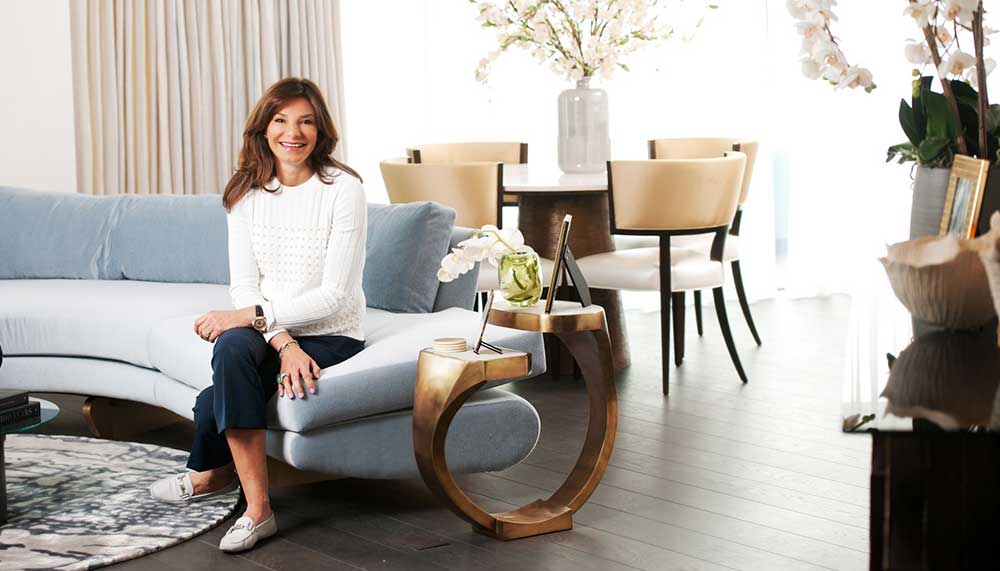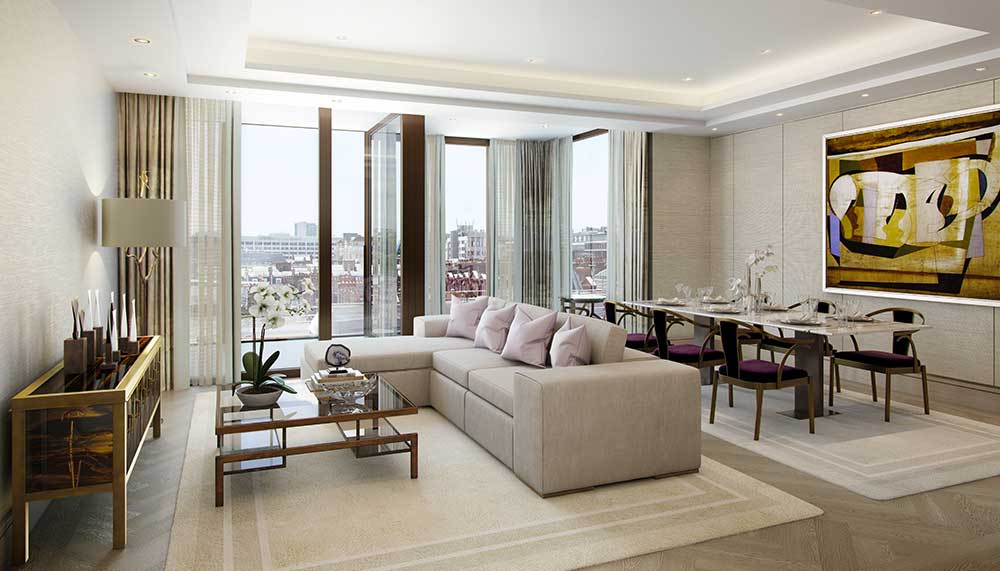Why the London property market needs developers like Ronson Capital Partners

Moving on up
On the Millbank bend of the Thames, a beautiful new development has been completed. Exuding a sedate, restrained aura of luxury that is quite British, Riverwalk, as the property is known, is mere minutes walk away from Tate Britain, The Houses of Parliament and Westminster Abbey. Developed by Ronson Capital Partners, founded by Gerald M. Ronson of Heron International, it enters occupation just as question marks pop up over the health of the London property market in the wake of Brexit.
It has to be asked. How healthy is the property market in London, where growth has been particularly blistering in the luxury segment over the last decade? Real estate agency Savills doesn’t believe the market will crash but is predicting some gloomy times ahead – zero or negative growth in prices as uncertainty remains a drag until 2019, when the prime central London market picks up again. Brexit may cause some inertia, it believes, but the appeal of London is far more long-term and deep-rooted, remaining a world city with international appeal, enhanced by aspects such as education, transparency and stability.
It is developments like Riverwalk that maintain optimism that London will weather the storm. Designed by architects Stanton Williams as 116 units spread across a 6- and 17-storey building, it looks like it belongs. The flowing curves of the exterior mimic the lines of the river, with the circular pattern repeated inside most units, where a round entrance hallway sunbursts out into the rooms and living areas. Lisa Ronson, Commercial Director of Ronson Capital Partners and responsible for the ‘look and field’ of its project’s interiors, sums up the appeal of Riverwalk – “Our focus with Riverwalk was on light, space and organic shapes that match the curved architecture of the building, which in turn match the course of the river here. We could have easily chosen to build a regular rectangular building, which would have been far easier and actually given us more space to play with, but we felt we had to create something truly special to stand out.”

Mission accomplished, then. But it wasn’t always smooth sailing in achieving that ambition.
Given Riverwalk’s location directly opposite the British foreign intelligence service headquarters, one could imagine that there may have been complications. The spooks at MI6, however, were untroubled, even when photography drones were launched to capture aerial images. Trouble, though, came in the form of neighbours. London invests its residents with a great amount of power, and they wield it strategically. This affects the entire gestation of a project like Riverwalk – from whether it is approved, to the nature of the design, to even minor things like the colour of hoardings put up. Anything in this city can spark off a complaint, and it often does.
It is the same sort of growing pains that another project had to undergo. Developed by Heron International prior to the formation of Ronson Capital Partners, The Heron is a unique public-private partnership with the City of London that yielded a new concert hall for the Guildhall School of Music and Drama and the largest residential development in the City since 1974. Looking back, the success of this 284-unit project would have seemed assured, but it too had to convince a lot of naysayers.
Chief among those were residents of the neighbouring Barbican. They protested over every aspect of the project. They worried that it would remove their ‘right to light’ – enshrined in English law as a right to receive sufficient illumination. They worried that it would block their views of the sky. They worried that the neighbourhood would become rowdy. Each one of those had to be addressed, between architect David Walker, the City of London council and Heron International. Lisa Ronson vividly remembers going from apartment to apartment in the closest section of the Barbican, Speed House, with spectrophotometry instruments and experts to prove that The Heron would not shroud them in perpetual darkness. Yet their claims still dictated the only form that The Heron could take – a squat block next to a tall, thin tower was the only shape that would guarantee right to light.
In the South Penthouse of The Heron, absorbed in Ronson Capital Partners’ London Collection, the views of London from the double-storey living room seem to make all that trouble worthwhile. Just as the views from the terrace of Riverwalk’s Penthouse – brilliantly furnished by interior designers Spinocchia Freund with landscaping by Stephen Woodhams – justify the trials faced. But though the building is now complete, there are still complaints. In this part of London, under Westminster City Council, arbitration comes in the form of Robert Davies, who chaired the planning committee until the end of December 2016.
“My job is to mediate,” said Davies in his office overlooking Buckingham Palace. “I have to give everyone a fair chance to be heard, and weigh their opinions. We then work together with people like Ronson Capital Partners to perhaps modify the design to address those complaints. Some times it works. Other times, it might not. But ultimately, I can’t please everybody and the decision I make is for the better of the city.” That includes anything from maintaining the balance of commercial and residential properties – “If I approve too many residential-to-commercial projects in Victoria, the area would lose its charm” – to assuaging individual grievances – “I had one constituent ask if I could halt work at a construction site until his mother recovered from her illness in three months. I had to say no, because it is my responsibility to see the bigger picture.”
It was those concerns that Davies and Lisa Ronson had to address in getting the planning permission for Chiltern Place in Marylebone. A charming area sandwiched between Regent’s Park and Oxford Street, Marylebone maintains a distinctively village-like atmosphere even in the heart of London. And residents here viewed the prospect of a new luxury high-rise with suspicion. “The only reason, in fact, that Chiltern Place received planning permission,” says Davies, “was that it was replacing an existing high-rise. Without that, it would have faced far stiffer opposition.”

Tucked away in a corner just up the road from Chiltern Firehouse – the current epicentre of celebrity sightings in London – Chiltern Place may be the third project under Ronson Capital Partners, but it was the first chronologically. The site was bought in 2011 and now construction is almost complete. When the scaffolding comes off, it will have a terracotta façade designed by PLP Architecture to blend into Marylebone’s Georgian surroundings. The interiors, masterminded by Tomasz Starzewski Home, will be lush, airy and modern without being overbearing. It is an aesthetic balance that Ronson Capital Partners has refined over the year. “The Heron was our first luxury residential project,” says Lisa, “and to be honest, it was probably over-specced. But we took what we learnt from that and poured that into Riverwalk, and what we learn from Riverwalk, we are putting into Chiltern Place.”
Given the current ambiguity surrounding Brexit though, how confident can one be in investing in London property? “There has been a slowdown, no doubt,” says Lisa. “But we believe we are offering a quality product and there is always a market for that. Over 80% of Riverwalk has been sold, and we have had great performance in Chiltern Place. Our clients, too, aren’t the flashy sort. In fact, I believe more than half of our buyers are British. We have a lot of interest from Europe as well, and while there is interest from Russia, Asia and the Middle East, it isn’t of the fleeting sort.”
And it shouldn’t be. Ronson Capital Partners have been very careful in selecting and developing their projects, while being respectful of the neighbourhood and neighbours. It isn’t brash and it isn’t flash. These are homes meant to be lived in, not trading hands for capital gains. The latter is ephemeral, the former enduring. Aiming squaring for the latter, properties like The Heron, Riverwalk and Chiltern Place – and developers like Ronson Capital Partners – are the ones that a city like London needs.

















